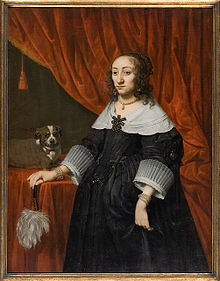Katharina Charlotte of Pfalz-Zweibrücken

Katharina Charlotte von Pfalz-Zweibrücken (born January 11, 1615 in Zweibrücken , † March 21, 1651 in Düsseldorf ) was born Countess Palatinate of Zweibrücken and by marriage Duchess of Jülich-Berg and Countess Palatine of Neuburg .
Life
Katharina Charlotte was a daughter of Duke and Count Palatine Johann II of Zweibrücken (1584–1635) from his second marriage to Luise Juliane (1594–1640), daughter of Elector Friedrich IV of the Palatinate .
The reformed princess was married in Zweibrücken in 1631 to the Duke and Count Palatine Wolfgang Wilhelm von Neuburg (1578–1653), a cousin of her father. The marriage of the bride and groom belonging to different faiths was intended to strengthen the Palatinate family ties. Wolfgang Wilhelm had converted to Catholicism in 1614 and, with the support of the Emperor, the King of Spain and some German imperial princes, tried to obtain a papal dispensation for his second marriage. Pope Urban VIII consulted extensively on this matter with cardinals who were familiar with the situation in Germany. The dispensation was granted on the condition that any children from the marriage should be brought up in the Catholic faith and that Wolfgang Wilhelm should influence his wife so that she too could find her way back to the Catholic doctrine. This meant the sacramental recognition of marriages between Catholics and Protestants, which was no longer issued under Urban's successor, Innocent X. Katharina Charlotte remained a Protestant until the end of her life.
Katharina was buried on April 4, 1651 in the princely crypt of the collegiate church of St. Lambertus , because the Jesuits and the Archbishop of Cologne refused to bury the Calvinist in the newly built St. Andrew's Church . The Duchess bequeathed an annual donation to the poor in Zweibrücken, Lichtenberg, Neucastell and Meisenheim.
progeny
Katharina Charlotte had two children from their marriage:
- Ferdinand Philipp (7 May 1633 - 21 September 1633)
- Eleonore Franziska (April 9, 1634 - November 23, 1634)
literature
- The reason of beatitude / Sampt draft / How a Christian should most appropriately wind himself up outside of all religious disputes / and by the time-old Apostolic Catholic Christianity / so from the times of the apostles / accepted / found / live and remain by all old believers: to which ancient Catholic reason for belief ... confesses; The Weylandt; Most lucid princess and Fraw / Fraw Catharina Charlotta / born and wed Pfaltzgräffinne near the Rhine in Bavaria / to Gülich / Cleve and Berg / Hertzoginne / Graevinne to Veldenz / the Marck / and Ravensberg / Frauw zu Ravenstein etc. most blessedly: Remembered: Our gracious prince und Frauw: In which also / Dero Fürstl: Durchl: persistently bit to the end insists / and the 11/21 Martii of the year 1651. by a gentle blissful death divorced from this world. And afterwards the 25th Martii / 4. Aprilis ... zu Dusseldorff ... was seated / In a crowd-rich gathering ... presented and explained by Johannem Hundium
- Christoph Friedrich von Ammon: The mixed marriages, namely of Catholics and Protestants, according to the views of Christianity, history, law and morality, presented with special consideration for the religious need of the time , Arnold, 1839, p. 163 ff.
- Gustav Marseille: Studies on the ecclesiastical politics of Count Palatine Wolfgang Wilhelm von Neuburg, Düsseldorf 1898 (135 pp. As separate print); Contributions to the history of the Lower Rhine. Yearbook of the Düsseldorfer Geschichtsverein 13 (1898), pp. 1–111.
Web links
Individual evidence
- ^ Johann Michael von Söltl : The pious and mild foundations of the Wittelsbacher over a large part of Germany , Krüll, 1858, p. 125
| personal data | |
|---|---|
| SURNAME | Katharina Charlotte of Pfalz-Zweibrücken |
| BRIEF DESCRIPTION | Countess Palatine and Duchess of Neuburg |
| DATE OF BIRTH | January 11, 1615 |
| PLACE OF BIRTH | Zweibrücken |
| DATE OF DEATH | March 21, 1651 |
| Place of death | Dusseldorf |